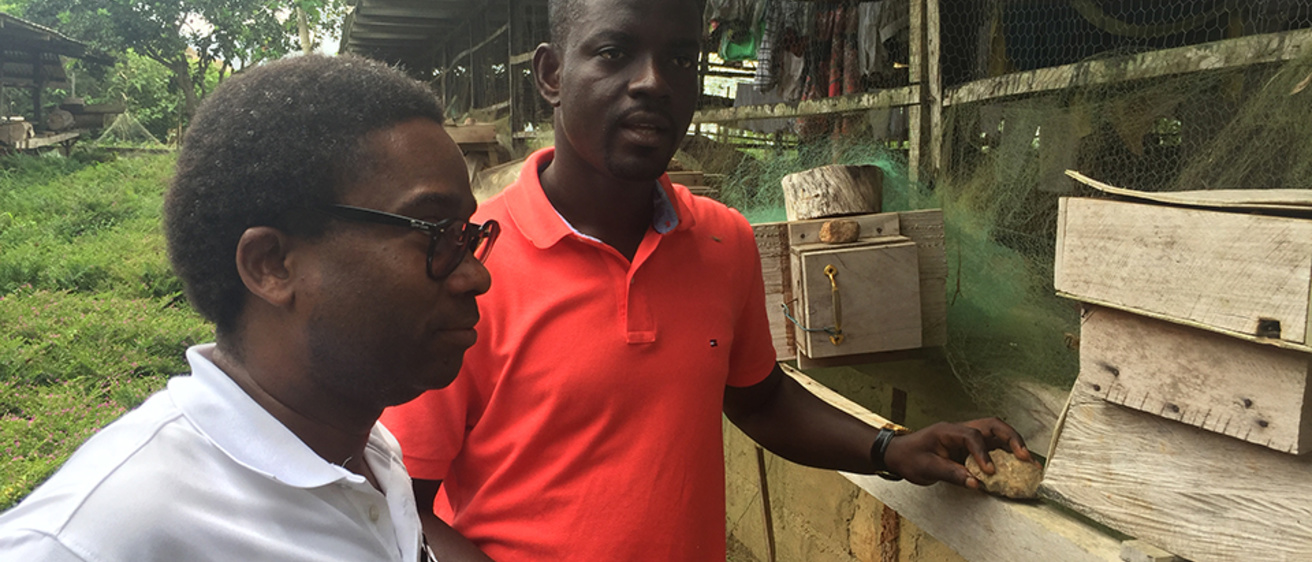Isaac Quaidoo came to the University of Iowa as an entrepreneur who sold honey when he was part of the Young African Leaders Initiative in 2017.
The experience gave him a new, more ambitious view of his business.
“Now, I want my business to be the household name in honey in Ghana,” says Quaidoo, who co-owns NexLinks Honey with his brother in the rural village of Efutu, Ghana. “When people in Ghana think of honey, I want them to think of NexLinks.”
A third class of Mandela Fellows arrived at UI in June 2018 to learn more about how to build a business and make connections with Iowans that they can take home with them. Many of the 50 former fellows from the two previous classes returned to their home countries in Africa and are building their own businesses while serving as citizen diplomats between Iowa and their homeland, says Dimy Doresca, who oversees Iowa’s YALI program as director of the Institute for International Business in the John Pappajohn Entrepreneurial Center (JPEC).
Quaidoo, in particular, is a model for a Mandela Fellow.
“He has made the type of impact we want to see from fellows who go through the program,” says Doresca. “He made connections with many people in Iowa and has reached out to them for help, and he has provided us with knowledge that helps us in return.”
Quaidoo, 30, started his beekeeping business in 2015. His hives house two types of bees—one is the wild African honeybee from which he harvests the honey that he sells. The other is a stingless bee from which he harvests propolis, a resin that stingless bees use in place of beeswax to store honey and pollen in their hives, and which also is used in traditional medicine to treat a variety of ailments, from aching joints to cancer.
But Quaidoo wanted his business to grow so in 2016 he applied to be a Mandela Washington Fellow through YALI, which is administered by the U.S. State Department, and arrived at UI in June 2017. He participated in Venture School while on campus, a month-long JPEC program that teaches would-be entrepreneurs the basics of business and the startup process.
2018 Young African Leaders Initiative at the University of Iowa
For a third year, the University of Iowa welcomes 25 Mandela Washington Fellows from sub-Saharan African countries.
A little info about this year's cohort:
20 countries represented
12 women, 13 men
The fellows' interests include agriculture and agribusiness, business, information technology, education, community development, women's/girls' issues, health issues, media, and more
More information can be found on the John Pappajohn Entrepreneurial Center website.
“It helped me reshape my business model and redefine my business,” says Quaidoo. “I was able to define my customer better and narrow down the kinds of people I’m providing services for.”
Venture School also drove home the point that owning a business should be about more than just making money.
“It’s not about only making profit, it’s about serving people like you’d like to be served yourself,” he says. “I came in as an entrepreneur and came out with a social enterprise tied to a business model.”
While at UI, Quaidoo attended a meeting of the Iowa Honey Producers Association in Cedar Rapids, which gave him many new ideas for his business. He realized he could sell not just honey and propolis, but creams, lotions, elixirs, and traditional medicines that are made from bee products.
“I saw the wide variety of honeybee products and realized there’s more to beekeeping than honey,” Quaidoo says.
He also met Bob Wolff, a Cedar Rapids beekeeper and member of the honey producers association. The two of them struck up a conversation about bees and beekeeping that continues to this day.
“Last fall, he asked if I’d be able to come to Ghana and show him and other beekeepers about how to add value-added bee products to their business, and of course I said yes,” says Wolff, who traveled to Efutu in May. The trip was funded by the State Department as part of the Mandela Reciprocal Exchange Program that pays for Americans to visit YALI alumni in Africa and continue their business development consulting.
Wolff showed Quaidoo and other beekeepers—including Oluwafemi Kochoni, a fellow 2017 Mandela Fellow who lives in Benin—how to make four lotions and creams using honey and propolis. He also taught them how to render and clean the wax so it can be used to make household items, such as beeswax candles.
“It gives them more opportunities to show villagers that they can generate revenue by raising bees, and by selling something other than honey,” Wolff says.
Quaidoo takes the lessons to heart. He’s test marketing creams and lotions with focus groups, and he plans to add new propolis-based products to take advantage of a push for healthier living among Ghanaians. The fact that his products are all made locally and sustainably will provide him with an edge, he says. He has 60 hives of stingless bees for propolis and 300 hives of honeybees, and plans to expand to more than 1,000 hives of both types.
“I’ve seen the potential of the business and I can see its future,” he says. “People here are becoming more health-conscious and that’s a good position for us to be in.”
He remembers what he learned about social entrepreneurialism, too, and is teaching other farmers near his village about beekeeping so they can raise their own bees and, in return, their standard of living.
He also hopes to return to Iowa one day to meet again with the friends he made at UI and across the state.
“I had an awesome experience as a Mandela Fellow at the University of Iowa,” Quaidoo says. “The people there were so great and they embraced all of us. I call Iowa City my second home.”
